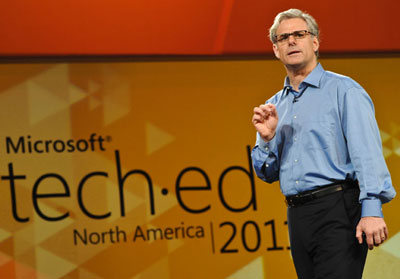Tech-Ed Analysis: Low-Key But Not Uninteresting
Something or someone called the Glitch Mob opened for the Microsoft keynote at Tech-Ed this morning. Aside from having what seems like a very unfortunate name for a group performing at a tech conference, the Glitch Mob wasn't Microsoft's typical pre-keynote fare.
In the past, Microsoft has blasted early-morning attendees with musicians banging on drums and dancers descending from the ceiling on wires. But today, the Glitch Mob just kind of grooved, offering some sort of dance music and generally hanging in the background.
That set the tone for a keynote that featured a couple of relatively unknown Redmondians, Robert Wahbe and Jason Zander, both corporate vice presidents and neither with the energy of Microsoft CEO Steve Ballmer who, if he's here, didn't show up to say a few words this morning.

|
| Robert Wahbe, corporate vice president, Server and Tools Marketing Group at Microsoft Corp., delivers the keynote speech at Tech-Ed North America 2011. May 16, Redmond, Wash. Source: Microsoft Corp. |
Wahbe and Zander gave over to lots of demos -- more than we usually see at a Microsoft event, it seemed -- and didn't offer too much in the way of long-term vision. Zander's explanation of Visual Studio vNext, which is supposed to bring non-developer types into the Visual Studio mix, was worth hearing but seemed to lose much of the audience about halfway though.
Still, vNext could be a huge product for Microsoft if it really can tie "application stakeholders," as the company calls them, along with a broad base of IT professionals, into the development circle. vNext could take Visual Studio from a popular development tool to something closer to an application design and execution platform. That's a broad vision for an application that still resides mostly in the hard-core dev realm at this point.
Likewise, the improvements coming in Mango, the next version of Windows Phone 7, looked impressive on the big screen at Tech-Ed and could make the mobile OS a much more serious player in the market. Integration with Lync Server, which is clearly a big corporate priority at Microsoft (see the Skype acquisition), will be huge for Mango's usefulness in the enterprise.
Could Mango, and by extension Windows Phone 7, be the next BlackBerry, the mobile OS for the serious businessperson? It looks as though Microsoft might be setting it up to be just that. Windows Phone 7 might never have the hipster appeal of the iPhone or the wide-open charm of Android, but it has a clean interface and looks pretty useful, and native integration with much-used Microsoft technologies can only help its prospects.
So Tech-Ed didn't blow the roof off the cavernous Georgia World Conference Center here in Atlanta, but its highlights represent important steps forward for major Microsoft properties. There has been other news, too -- enhanced virtualization capabilities for Exchange, for instance -- which has fit into the same category, not headline-grabbing but certainly of interest to the audience that has made the trip to the American South and probably to a lot of other partners and Microsoft IT professionals, as well.
More Tech-Ed Analysis:
Posted by Lee Pender on May 16, 2011